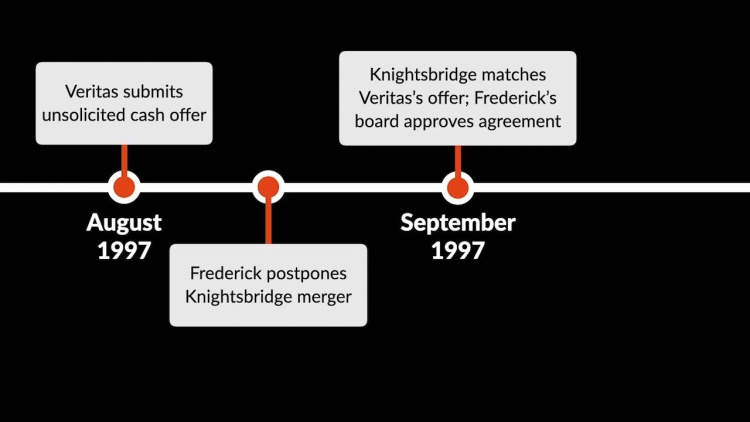Malpiede v. Townson
Supreme Court of Delaware
780 A.2d 1075 (2001)
- Written by John Caddell, JD
Facts
Frederick’s of Hollywood (Frederick) was the target of a bidding contest between Knightsbridge Capital Corporation (Knightsbridge) and two other suitors. After several rounds of bidding, Knightsbridge made an offer of $7.75 per share on September 6, 1997. The offer was conditioned on Frederick’s accepting strict limitations on its ability to entertain other offers. Frederick’s board unanimously accepted Knightsbridge’s terms. On September 11, 1997, Veritas, Inc. made an offer of $9 per share. Frederick’s board rejected the offer, citing the agreed-upon restrictions among other factors. Knightsbridge ultimately completed the merger and acquired Frederick. Frederick’s articles of incorporation included an exculpatory provision pursuant to Delaware General Corporation Law (DCL) § 102(b)(7). The provision shield its directors from personal liability provided they have not acted in bad faith or breached their duty of loyalty to the corporation. Disaffected Frederick shareholders (plaintiffs) sued the directors of Frederick, arguing that they breached their fiduciary duty. They asserted that one of the four directors received improper personal benefits from the transaction, and that together they improperly favored Knightsbridge over other bidders. The trial court dismissed the suit for failure to state a claim, ruling that the directors were shielded by the exculpatory provision. The shareholders appealed.
Rule of Law
Issue
Holding and Reasoning (Veasey, C.J.)
What to do next…
Here's why 907,000 law students have relied on our case briefs:
- Written by law professors and practitioners, not other law students. 47,100 briefs, keyed to 996 casebooks. Top-notch customer support.
- The right amount of information, includes the facts, issues, rule of law, holding and reasoning, and any concurrences and dissents.
- Access in your classes, works on your mobile and tablet. Massive library of related video lessons and high quality multiple-choice questions.
- Easy to use, uniform format for every case brief. Written in plain English, not in legalese. Our briefs summarize and simplify; they don’t just repeat the court’s language.





